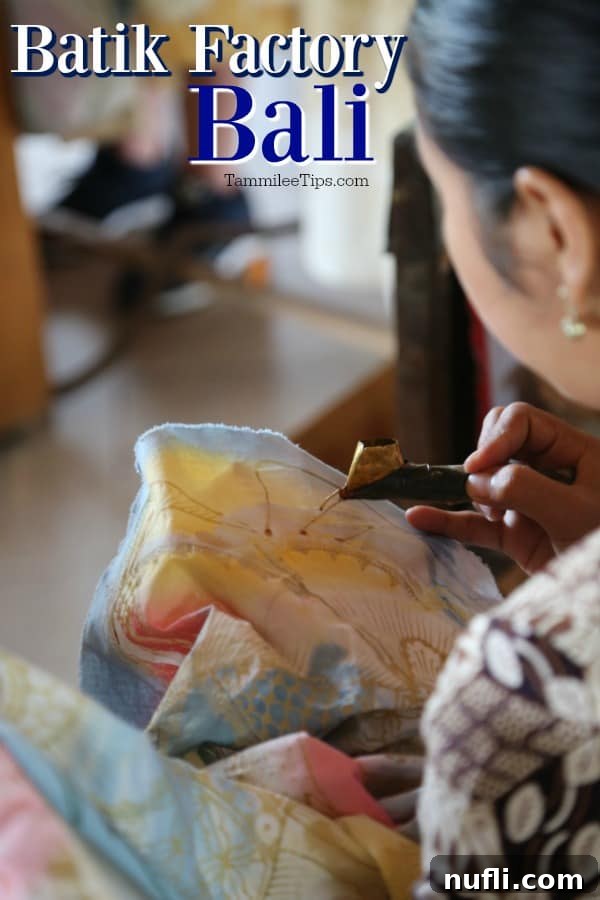Bali, often dubbed the “Island of the Gods,” captivates visitors with its vibrant culture, stunning landscapes, and warm hospitality. Beyond its pristine beaches and lush rice paddies, Bali is a treasure trove of artistic expression, with its traditional crafts telling stories of heritage and skill. During a memorable trip to this enchanting Indonesian island, our tour guide suggested a visit to a batik factory. Initially, the idea conjured images of a generic, overly touristy stop – a common pitfall for travelers hoping for authentic experiences. Little did I know, this seemingly ordinary suggestion would evolve into one of the most enriching and cherished moments of our Balinese adventure.
The stop at the batik factory transcended my low expectations, transforming what I anticipated to be a brief, uninspired visit into a fascinating dive into a rich cultural art form. It quickly became one of the standout highlights of our entire trip. Among the many beautiful creations, we discovered an exquisite bedspread cover, a piece of art that we enthusiastically brought home with us. Now, each evening, as we settle into bed, the intricate patterns and vibrant colors serve as a beautiful, tangible reminder of our incredible journey to Bali and the profound affection I developed for this magical island.
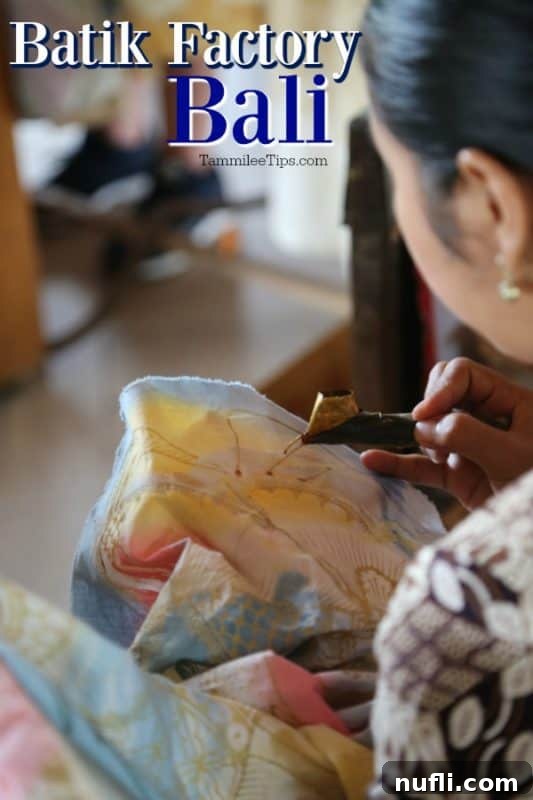
Quick Guide to Planning Your Bali Adventure:
Discover the best of Bali with these essential resources:
🏨 Find Hotels and Vacation Rentals
📍 Book Exciting Tours and Activities
Unveiling the Ancient Art of Batik in Bali: A Cultural Immersion
Stepping into the world of Balinese batik was an experience that truly broadened my understanding of local craftsmanship. While the factory itself had elements tailored for tourists, the genuine artistry and dedicated labor on display made it profoundly interesting. The magic began even before entering the main store, where local artisans were diligently engaged in the meticulous process of batik creation. Observing them, it became clear that this was more than just a craft; it was a deeply rooted tradition, passed down through generations, embodying patience, precision, and an eye for intricate beauty.
Batik, an ancient textile art, involves drawing patterns on fabric using wax-resist dyeing techniques. The word “batik” itself is believed to originate from the Javanese word “amba,” meaning “to write,” and “titik,” meaning “dot,” highlighting the detailed work involved. The process typically starts with a plain piece of fabric, usually cotton or silk, on which a design is sketched. Molten wax is then applied to the areas of the fabric that the artist wishes to remain un-dyed. This can be done either with a “canting,” a pen-like tool with a small reservoir for the wax, or with “cap,” a copper stamp used for repeated patterns. The precision required to wield the canting, drawing delicate lines and dots with hot wax without error, is nothing short of astonishing. Witnessing this steady hand and the focus of the artisans was truly mesmerizing; it’s a testament to years of practice and an innate artistic talent.
The Mesmerizing Process: From Wax to Masterpiece
The art of batik is a multi-step journey. After the initial wax application, the fabric is dyed. The wax acts as a resist, preventing the dye from penetrating the covered areas. Once dyed and dried, the wax is removed, typically by boiling the fabric, revealing the intricate patterns. For multi-colored designs, this process is repeated: waxing new areas, re-dyeing with a different color, and removing the wax again. Each layer of wax and dye adds depth and complexity, creating a finished product that is rich in texture and color. This laborious technique underscores why genuine batik pieces are highly valued and considered true works of art. The delicate balance between creativity and technical skill is what makes Balinese batik so unique and captivating.
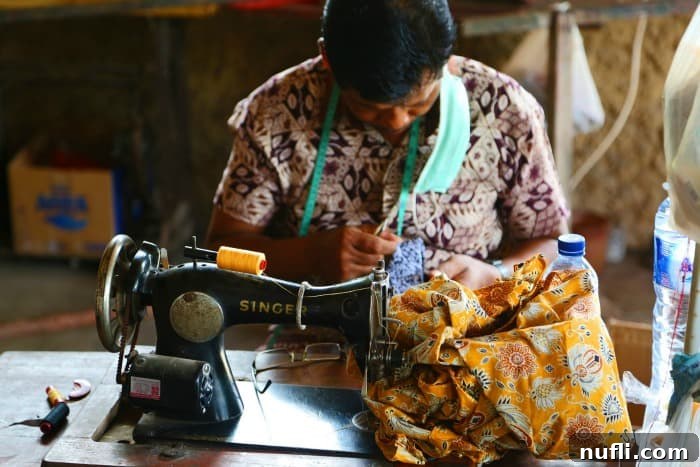
Navigating the Showroom: A Shopper’s Paradise
Once inside the factory’s expansive showroom, the atmosphere shifted to a full-on tourist experience, which, frankly, is often what one expects from such a popular destination stop. These establishments are frequently included in itineraries for tour groups and cruise ship passengers, designed to offer a convenient and comprehensive shopping opportunity. Upon entering, visitors are often greeted by a “handler” – a staff member assigned to guide you through the various sections. This person, as we later discovered, is also the individual with whom you are expected to engage in the art of bargaining for your chosen products. We, unfortunately, missed this crucial memo during our visit and ended up paying the listed price, likely more than we would have if we had known to negotiate. However, the beauty and quality of our purchased bedspread still bring us immense joy, making the entire experience, even with the slight overpayment, entirely worthwhile.
The sheer variety of batik products available was astounding, truly offering something for every taste and need. From elegant clothing items like shirts, dresses, and sarongs to practical accessories such as shoes, handbags, and fans, the creativity infused into each piece was evident. Home decor items ranged from intricate wall hangings and tablecloths to, of course, the vibrant bedspreads that caught our eye. Every corner of the store presented a new discovery, showcasing how the traditional art of batik has been skillfully adapted into contemporary products, making it possible for visitors to take a piece of Balinese culture home with them.
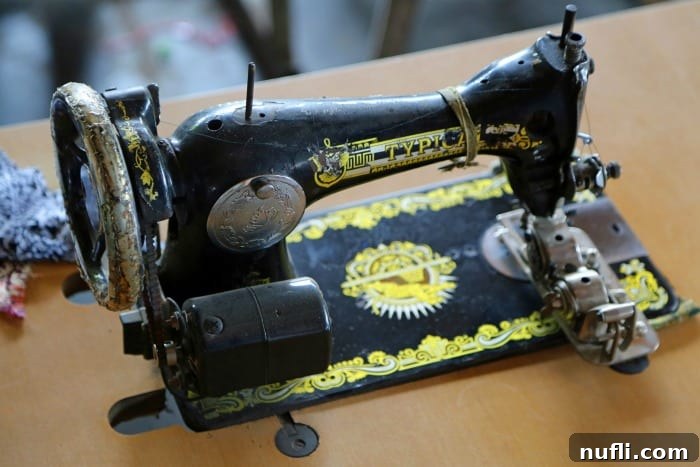
It’s fascinating to see such vintage equipment still in use, connecting the present craftsmanship with historical techniques. This old-school Singer sewing machine, a testament to enduring quality and utility, adds another layer of authenticity to the production process.
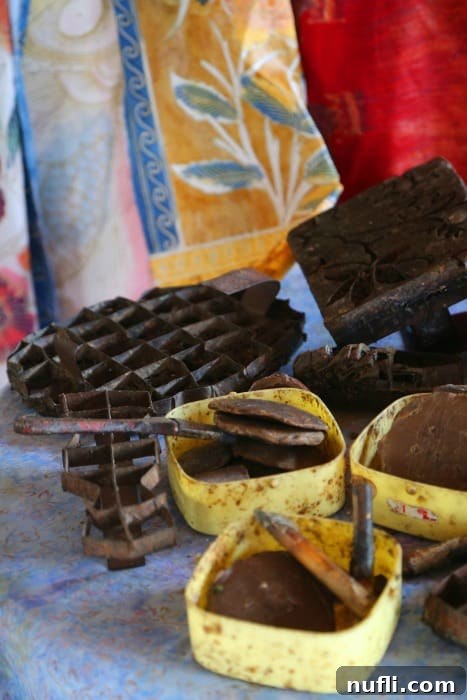
These are the fundamental instruments of batik art, showcasing the simplicity yet profound effectiveness of the traditional tools used by Balinese artisans for centuries.
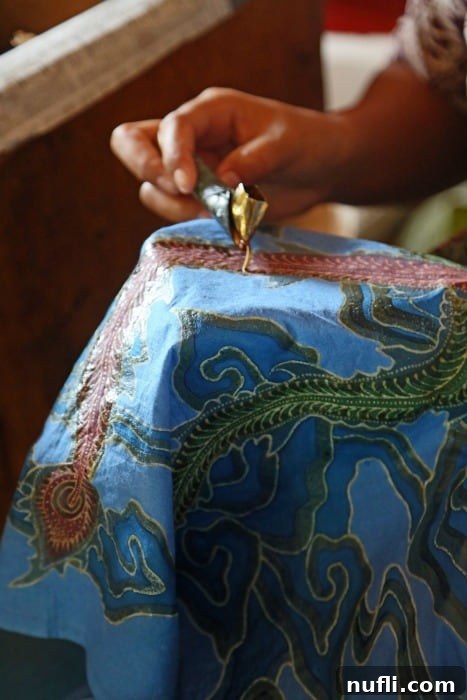
Witnessing the delicate process of wax application firsthand provides an unparalleled appreciation for the skill and patience required to transform plain fabric into a work of art. Each stroke contributes to a masterpiece.
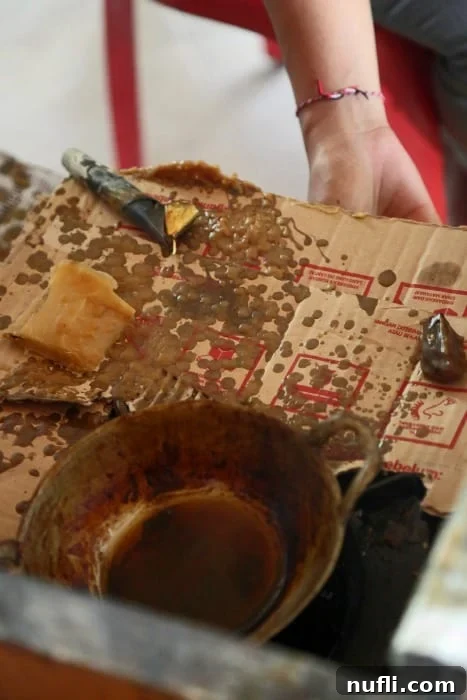
The tools and wax-covered patterns here are crucial elements in creating the distinct designs of batik, where the wax acts as a barrier, reserving areas from dye and forming the final intricate artwork.
For those inspired to explore this captivating art form further or to discover the perfect batik souvenir, there are numerous guided experiences available. Engage with local culture and find unique pieces by checking out all the batik tours in Bali here. These tours often provide deeper insights into the production process and offer opportunities to purchase authentic items directly from artisans.
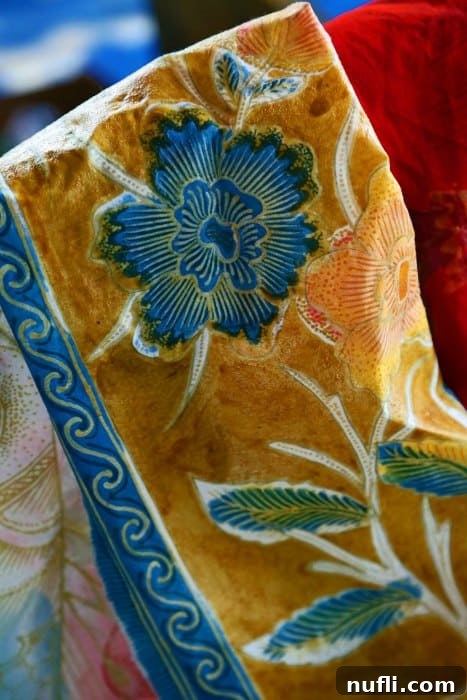
The vivid colors and natural motifs, like this striking purple flower, are characteristic of Balinese batik, reflecting the island’s lush environment and artistic spirit.
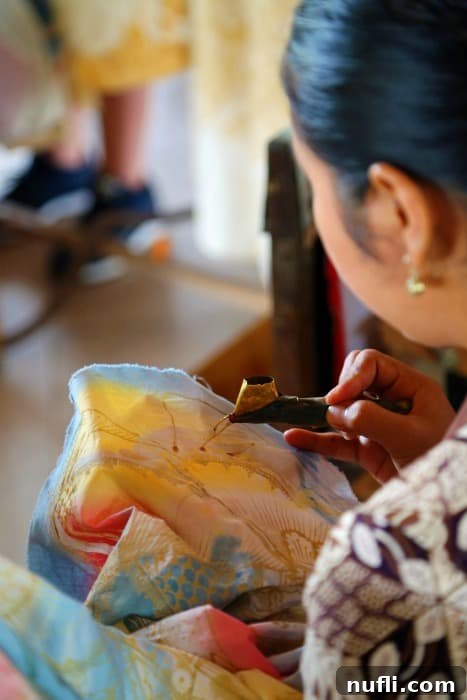
This image beautifully captures the dedicated effort and artistic skill involved in every single piece of hand-crafted batik, a truly personal touch.
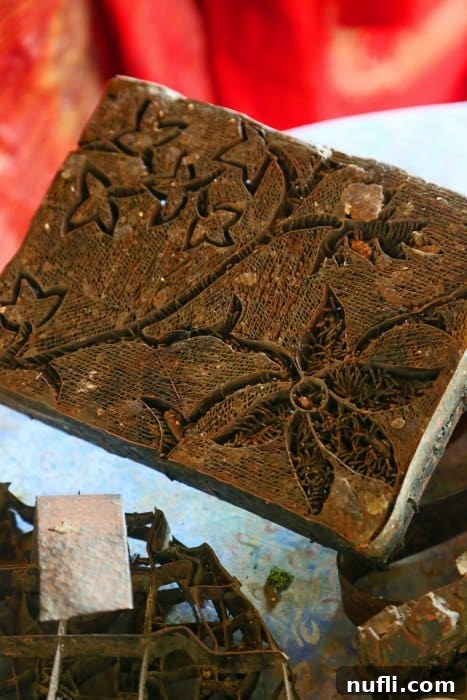
Utilizing a wooden press or ‘cap’ for repeated patterns is another method in batik making, allowing for consistency in intricate designs while still requiring precision and artistry.
Don’t miss the opportunity to dive deeper into the world of Balinese batik and discover exquisite pieces. Find your perfect cultural experience by exploring all batik tours in Bali here.
Extend Your Bali Exploration: More Unforgettable Experiences
Your journey through Bali’s rich tapestry of culture and adventure doesn’t have to end with batik. The island offers a myriad of experiences, from tranquil spa retreats to ancient historical sites and vibrant dance performances. To help you plan an even more comprehensive Balinese adventure, we’ve curated a selection of articles detailing other must-see attractions and activities:
- Indulge in Rejuvenating Bali Spa Experiences
- Maximize Your Adventure with Groupon Deals in Bali
- Explore the Serene Beauty of Tirta Gangga Water Palace Bali
- Discover the Mystical Elephant Cave in Bali (Goa Gajah)
- Experience the Dramatic Barong and Kris Dance in Bali
For a complete guide to planning your dream vacation, make sure to check out all of our dedicated Bali Travel Guides. From cultural insights to practical tips, we’re here to help you make the most of your visit to the Island of the Gods.
